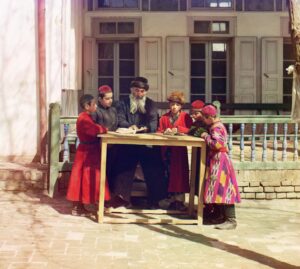Afterlives of Urban Muslim Asia Workshop
It is widely accepted that over the past century, conflict in Muslim Asia and large-scale migrations from the region of both minorities and Muslims have led to a loss of cosmopolitan habits of inter-religious living. The workshop will question the notion that Muslim Asia’s legacy of urban cosmopolitanism has simply been lost. Instead of focusing on the declining diversity of Muslim Asia’s urban centres, we will investigate their afterlives: the ongoing significance of the cultural legacies of urban centres in places elsewhere. A century after migrating from urban centres across the Emirate of Bukhara – especially Bukhara and Samarqand – a wide variety of communities continue to identify themselves as ‘Bukharan’. Likewise, many Jews who left for the USA in Syria in the 1920s continue to refer to themselves as Aleppine Jews, as do their co-religionists who arrived in New York in the 1990s.
Focusing on four urban centres – Aleppo, Bukhara, Kabul and Herat – the workshop will explore the relationships – imagined and lived – that exist between migrant  communities and their cities of origin and ask how far these cities continue to be a powerful source of identity. We will also explore the legacies of cosmopolitan urban living in the selected cities through a consideration of diffuse habits and patterns of behaviour, asking to what extent these remain vital, even as generations might have elapsed since migration from Muslim Asia. We will also ask about the cultural, geographic, and political imaginaries in which the selected cities play a role today, through a consideration of discourses of urban heritage, and genres (architectural, textual, visual, poetic, culinary, literary) identified as ‘intangible heritage’. What role do such forms of heritage play in historic centres’ status as sites of identity and imagination?
communities and their cities of origin and ask how far these cities continue to be a powerful source of identity. We will also explore the legacies of cosmopolitan urban living in the selected cities through a consideration of diffuse habits and patterns of behaviour, asking to what extent these remain vital, even as generations might have elapsed since migration from Muslim Asia. We will also ask about the cultural, geographic, and political imaginaries in which the selected cities play a role today, through a consideration of discourses of urban heritage, and genres (architectural, textual, visual, poetic, culinary, literary) identified as ‘intangible heritage’. What role do such forms of heritage play in historic centres’ status as sites of identity and imagination?
The workshop on 23rd May 2023, at Darwin College at the University of Cambridge, will bring together researchers and commentators to discuss the relationships and identities revealed across these four centres.
Speakers:
Panel 1
Shah Mahmoud Hanifi – Historicizing Social Power: Residual and Emergent Minority Identities in Kabul
Magnus Marsden – The Afterlife of Afghanistan’s Cosmopolitanism: Sikhs, Muslims and Markets in London
Panel 2
Ariane Sadjed – Bukharan Jews – from a “Central Asian” to a “Jewish” identity
Thomas Loy – Moving out and staying connected – Constructing a Bukharan Jewish Past and Present after leaving Central Asia
Panel 3
Paul Anderson – Contesting heritage: imaginaries of Halab among Syrian Jewry in New York
Hasan Kujjah – Aleppo cosmopolitanism in contemporary writings and poems
Panel 4
Vera Skvrskaja – Coexistence, Migration and People’s Diplomacy: the Case of Bukharan Jews
Magnus Marsden & Shahla Muram – Afghan Jews in the Twentieth Century and Beyond
For more information on this AHRC-funded project, see http://www.sussex.ac.uk/global/research/researchprojects/afterlivesofurbanmuslimasia
With thanks to Darwin College and Westminster College for their support.

